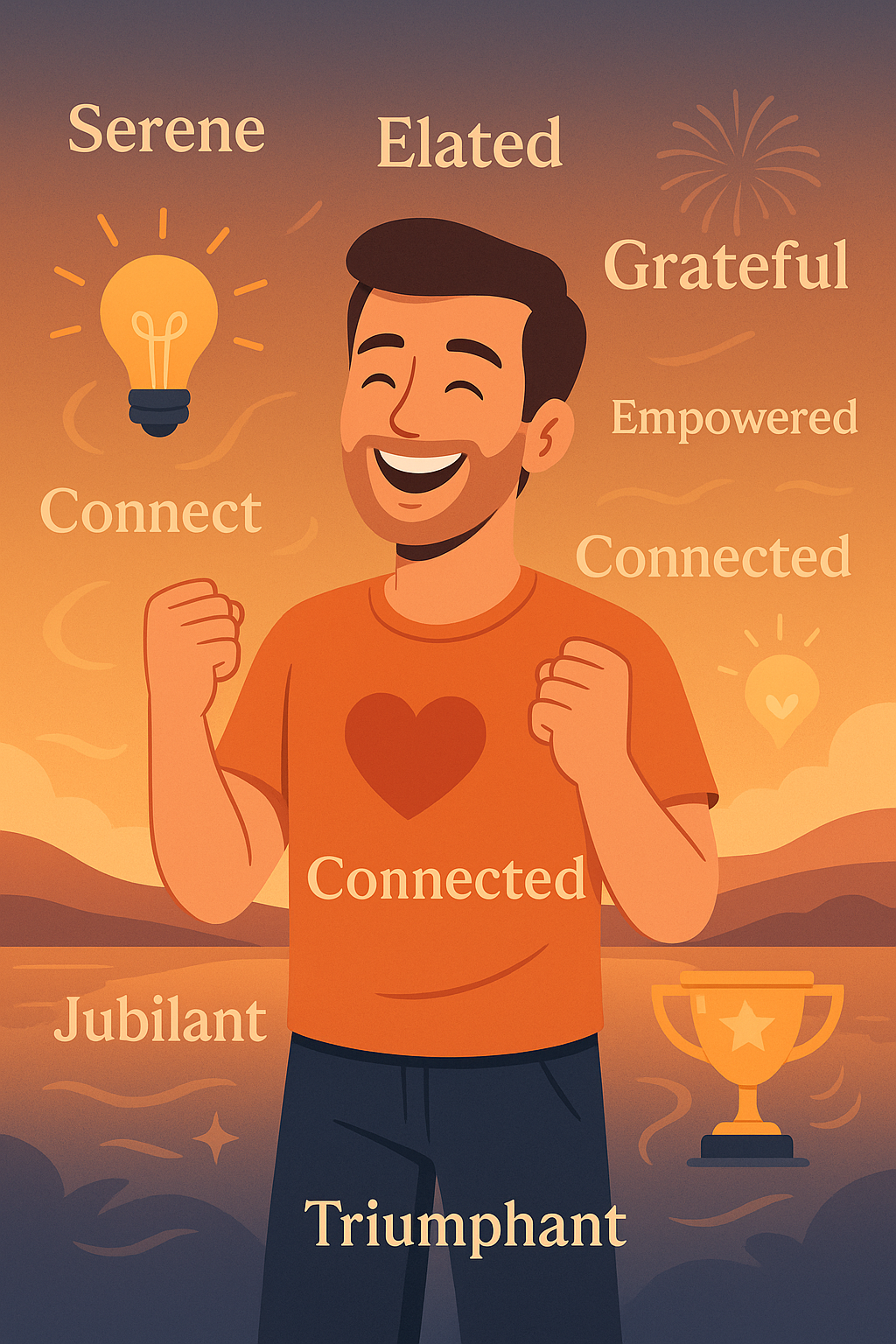
Savoring Joy: Why I Keep Missing The Good Stuff
My daughter handed me a crayon drawing yesterday—a T-Rex in a pink tutu doing what looked like ballet. I glanced at it, mumbled "nice," and went back to scrolling news about things I can't control.
Nice. That's all I gave this moment of four-year-old genius. Ten minutes later, I'm deep in an article about economic uncertainty, shoulders tight, jaw clenched.
Why is it so easy to marinate in worry but barely register the good stuff?
When Everything Is Just "Fine"
You know those conversations:
"How was your day?"
"Fine."
"How was the meeting?"
"It was okay."
"How's the project going?"
"Good."
We're living in this emotional beige. Everything's just... fine. Meanwhile, I have seventeen different ways to describe my stress levels. I can give you a dissertation on how anxiety feels in my body (like someone's sitting on my chest while simultaneously inflating a balloon behind my ribs). But happiness? Joy? Those are just... "good."
Research shows that when we use these vague words for positive experiences, we literally feel less joy. Our brains file it under "whatever" and move on. It's like having a 64-pack of crayons but only using gray.
The Day I Realized I'm Terrible at Joy
Last week something shifted. Perfect sunset, my favorite song came on, I'd just finished something I was proud of. The stars aligned.
My brain's response? "Nice."
That's when it hit me—I'm functionally illiterate when it comes to positive emotions.
I started working with Mind Hack Lab's Emotional Mastery techniques, and honestly, it felt weird at first. But stick with me.
What Actually Works (Not the Usual Gratitude Journal Guilt)
Look, I've tried the gratitude journal thing. It made me feel guilty about not being grateful enough. But learning actual skills for savoring joy through the Emotional Mastery & Self-Forgiveness program? Different story.
1. The Three-Second Pause
This sounds stupidly simple, but it works. When something good happens—even tiny good—pause for three seconds before moving on. That's it.
Yesterday, my coffee was the perfect temperature when I remembered it existed. Old me: wouldn't even notice. New me: paused, felt the warmth, noticed I felt... what's the word? Not just happy. More like... content? Satisfied?
See? I'm still learning, but at least I'm trying.
2. The Word Hunt
Mind Hack Lab taught me to hunt for the specific word. Not just "happy" but:
- Amused (when my cat fell off the couch trying to look dignified)
- Relieved (when that meeting ended early)
- Triumphant (when I finally fixed that spreadsheet formula)
- Delighted (haven't used this one yet but I'm ready)
At first, it felt pretentious. Who says "delighted"? But here's the thing—your brain doesn't know you're being pretentious. It just knows you're paying attention to something good for once.
3. The Body Check
This one's weird but works. When you notice something positive, check what your body's doing. I realized my shoulders drop when I'm genuinely content. My face does this micro-relaxation thing when I'm amused.
Now when I notice those body feelings, I can work backwards to the emotion. Shoulders dropped? Oh, I must be feeling peaceful. That little chest warmth? That's fondness.
It's like learning a new language, except the language is your own experience.
The Plot Twist Nobody Tells You
Savoring joy is a skill. Like an actual skill you have to practice. I thought joy just happened to you. Turns out you have to show up for it.
My friend called her sandwich "glorious" yesterday. A SANDWICH. And she meant it. She experienced sandwich glory while I experienced... consuming nutrients.
But here's what's changing: I'm starting to catch moments I would have missed:
- That first breath of cool air when you step outside? I felt "refreshed." Actually refreshed, not just "it's nice out."
- When my neighbor's dog sighs dramatically? "Charmed." I was charmed.
- When I parallel parked on the first try? Not just "good"—I was proud. Maybe even a little triumphant.
Why This Actually Matters
I used to think savoring joy was luxury for people with perfect lives. Like, must be nice to have time to savor when you're drowning in deadlines.
But I'm learning it's the opposite. The savoring is what makes the stress bearable. It's not about more good things happening. It's about actually experiencing the good things that are already there.
Same stressful day. But also: cozy (morning coffee), accomplished (cleared three emails), grateful (friend sent a perfectly timed meme), peaceful (two minutes of silence in the car).
Same day. Completely different experience. Studies show that people with higher emotional granularity have better stress resilience and life satisfaction.
Start Where You Are (Which Is Probably "Fine")
If you're thinking "must be nice to feel joy, I'm just trying to survive"—I get it. Start there.
What does "fine" actually feel like in your body? What's the difference between "okay" and "not terrible"?
Mind Hack Lab's quick 30-minute session helped me understand that you can't jump from "everything sucks" to "life is magnificent." But you can go from "fine" to "decent." From "decent" to "actually pretty good."
Baby steps toward joy still count.
The Permission Slip Nobody Asked For
You're allowed to:
- Use fancy words for ordinary moments (your coffee can be "delightful")
- Feel satisfied about finding matching socks
- Notice good without waiting for the other shoe to drop
- Practice joy badly until you get better
What I'm Learning
This isn't fixed. Sometimes I still describe entire weeks as "fine."
But more often, I catch myself. I notice. I pause. I find the word.
The dinosaur in the tutu? I looked at it again this morning. Really looked. Felt something bloom in my chest. What's the word?
Tender? Delighted? Grateful?
All of the above.
And that's the thing—once you start paying attention, there's more joy than you thought. It was always there. You just needed the words to see it.
Ready to Expand Your Emotional Vocabulary Beyond "Fine"?
Mind Hack Lab has practical techniques that actually work (including that weird body-check thing that sounds fake but isn't).








